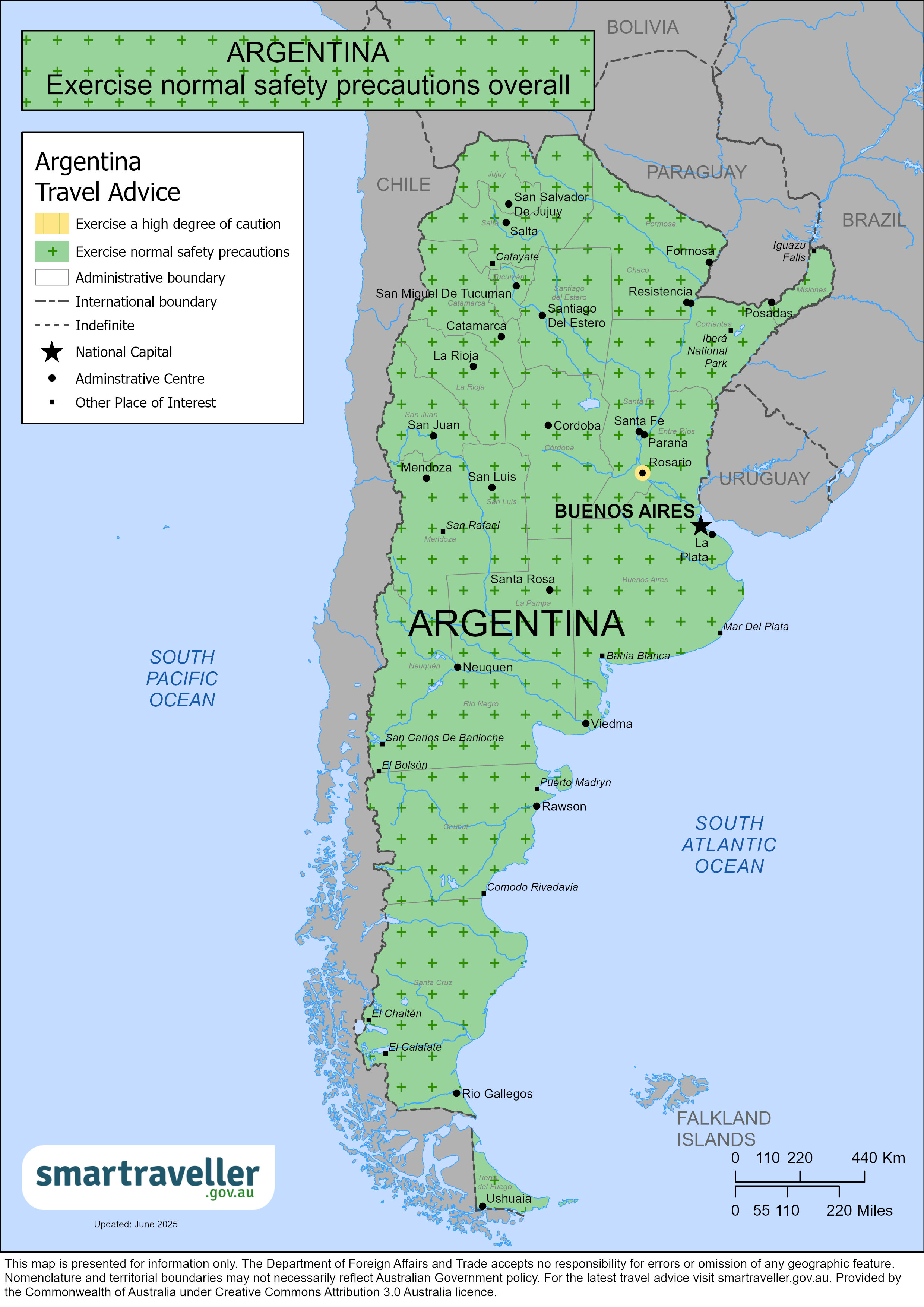Crime rates are significantly higher than in Australia. Thefts and robberies are common, especially in Buenos Aires city and its metropolitan area, as well as in other major cities, such as Rosario, Cordoba and Mendoza. You should keep cash and expensive items such as mobile phones, wallets and jewellery out of sight in public areas. Avoid lower socioeconomic urban areas where crime is more likely to occur. Avoid empty streets, especially after dark.
You should exercise a high degree of caution in the city of Rosario due to higher levels of drug-related crime and violence.
Petty crime
Petty crime, including pickpocketing, and bag/jewellery/mobile phone snatching is common, even during the day.
Take extra care on public transport and in busy pedestrian zones and tourist areas.
Distraction thefts are common in public areas, such as:
- train and bus stations
- outside and inside hotels
- restaurants and cafes
- subways, trains or buses
Robberies are frequent in and around bus stations, especially at:
- Retiro, Once, Constitucion bus and train stations in Buenos Aires
- Central bus station in Mendoza
Criminals might use force if you resist.
Robberies involving motorcycles, 'motochorros', are common in larger cities. Thieves usually work in pairs:
- one person operates the motorbike
- one jumps off and steals belongings from pedestrians
They'll also snatch items from inside vehicles.
Robberies are common in taxis.
Robbery and theft hotspots in tourist areas of the city of Buenos Aires include:
- La Boca
- San Telmo
- Palermo
- Congreso
- Plaza de Mayo
- Obelisk area
- Downtown (Micro Centro)
- Calle Florida (Florida Street)
- Buenos Aires ferry terminal
- Around the main train and bus stations
Violent crime
Armed robbery and other violent crimes occur in major tourist areas of:
- Buenos Aires and it’s metropolitan area
- Rosario
- Mendoza
- Cordoba
To reduce your risk of crime:
- stay within the tourist precinct in La Boca and avoid the entire area after dark. You should arrange your transport directly to and from the La Boca tourist area. Walking to La Boca isn't recommended
- be cautious in other tourist areas of Buenos Aires
- avoid using your mobile phone in the street
- always keep your personal belongings close and out of sight
- keep your purse or backpack containing valuables close to you and within sight. Do not hang bags and purses on chairs. It's better to keep them on your lap or between your feet.
- only use ATMs in banks and shopping centres. Avoid using them after dark.
- lock your passport and other valuables in a hotel safe
- carry a copy of your passport as ID
Violent organised and drug-related crime in Rosario is ongoing. Public transport and taxis have been affected. Monitor local media and follow the advice of local authorities.
Crimes relating to drug trafficking and illicit goods are common along the tri-border area of Argentina (Puerto Iguazu), Brazil and Paraguay, posing a risk of violent crime to travellers.
There have been reports of foreign tourists being robbed or assaulted after inviting into their accommodation, someone they recently met, online or in person.
Food and Drink spiking
Food and drinks can be spiked and could put you at risk of robbery or assault. Foreign tourists have been drugged and robbed of their belongings.
Drink spiking can happen anywhere. Be alert to the potential risks, and don't leave food or drinks unattended. Pay attention when your drinks are being mixed. If you feel any symptoms, tell your friends immediately. Ask someone you trust and know well to take you to a safe place. If a friend shows any of these symptoms, don't leave them alone. You may need to seek medical care.
Methanol poisoning
Locals and foreigners, including Australians, have died or become seriously ill from poisoned drinks overseas. Methanol is highly toxic. As little as one shot can be fatal. Methanol can be added or accidentally created during poor quality alcohol distillation and production. Protect yourself by making smart drink choices. Choose branded beers, ciders, wines and premixed cocktails in sealed bottles and cans. Get urgent medical help if you suspect you’ve been poisoned.
More information:
Kidnapping
Kidnapping occurs across the world with political, ideological and criminal motives. Foreigners, including Australians, have been kidnapped overseas while travelling. Kidnaps can happen anywhere, anytime, including in destinations that are typically at lower risk.
Kidnapping, virtual kidnapping and express kidnappings have occurred in Argentina.
The Australian Government's longstanding policy is that it doesn't make payments or concessions to kidnappers.
More information:
Road-based crime
Crimes against car passengers occur throughout the country. Thieves often target cars stopped at traffic lights and when parked.
Some criminals pose as taxi operators at the airport and rob passengers. They may work with other taxi drivers.
To reduce your risks while taking taxis or driving:
- consider calling a radio taxi or remise, or using a ride-hailing app which keeps a record of drivers
- avoid sharing taxis with strangers
- keep car windows closed, doors locked at all times and keep valuables out of sight
- do not leave valuables in your car, including in the boot.
If you're held up, don't resist.
Cyber security
You may be at risk of cyber-based threats during overseas travel to any country. Digital identity theft is a growing concern. Your devices and personal data can be compromised, especially if you’re connecting to Wi-Fi, using or connecting to shared or public computers, or to Bluetooth.
Social media can also be risky in destinations where there are social or political tensions, or laws that may seem unreasonable by Australian standards. Travellers have been refused entry or arrested for things they have said on social media. Don't comment on local or political events on your social media.
More information:



